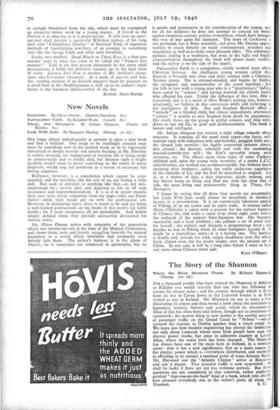New Novels
These, Our Strangers. By Adrian Alington. (Chatto and
Windus. 8s.) Lady With Jade. By Margaret Mackay. (Harrap. 9s. 6d.) ONE longs almost pathologically at present to open a new book and find it brilliant. One longs to be startlingly amused once more by something new in the printed word, or to be vigorously stimulated or deeply moved—not merely because, as Mr. Priestley is rightly insisting, the background of wartime life is being made so unnecessarily and so deadly dull, but because such a bright accident woull seem to prove something in the midst of many disproofs, would ring out positively in a season of necessary but boring negatives.
Brilliance, however, is a consolation which cannot be com- manded, and the novelists, like the rest of us, are feeling a trifle dull. Not sunk or defeatist or anything like that—do not mis- understand me ; merely dull, and disposed to fob us off with mechanics and representationalism. It is as if in recent months their eyes were astray somewhat from the page—who can blame them?—while their hands got on with the professional job. However, in distracting times, there is much to be said for being a well-trained professional—as the books of this week's list fairly testify ; for if none enraptures, all are presentable. And within simply defined limits they provide unexacting distraction for various tastes.
Mr. Oliver Onions writes with sympathy of the generation which was twenty-two-ish at the time of the Munich Conference, and shows them, male and female, struggling honestly for natural happiness in a world which bewilders and eventually most bitterly fails them. The author's humour is in the idiom of Punch ; he is sometimes too whimsical in apostrophe, but he is gentle and penetrative in his consideration of the young, and for all his mildness he does not attempt to conceal his wrath against twentieth-century politics everywhere, which have brought this woe of war upon the innocent. The story of Cockcrow is not profound, but it flows naturally, and gives Mr. Onions oppor- tunities to touch bitterly on many contemporary mistakes and stupidities, as well as to make some pleasant jokes. The arbitrarily pathetic ending is a weakness, but even so the light and kindly characterisation throughout the book will please many readers, and the author is on the side of the angels.
Fairweather Faith is a scrupulous, solidly worked story about Christian Science. An intelligent young woman called Alix Stanton is brought into close and daily contact with a Christian Science group. She is rational-minded, and begins by finding the arrogance and sentimentality of the creed repellent ; .but she falls in love with a young man who is a " practitioner," having been cured by " science " and having married the elderly healer who effected his cure. Under the influence of this love, Alix is converted, and it is a merit of Miss Wade's writing that, however reluctantly,, we believe in this conversion while still believing in the intelligence of Alix. She and Stephen Borwick effect a " miracle:" on a blinded child, but almost immediately afterwards "science " is unable to save Stephen from death by pneumonia. His death shows up the group .in pitiful colours, and Alix with- draws to her old life, in grief and disillusionment. The book is honest and intelligent.
Mr. Adrian Alington has written a mild village comedy about evacuees. It contains all the usual rural types—the fussy, self- centred vicar with ridiculous wife and horrible, priggish little son ; the absurd lady novelist ; the highly contrasted spinster sisters, also absurd ; the dreamy, scholarly earl with the enchanting musical-comedy-star wife ; the Earl's agreeable young male secretary, etc. The effects upon these types of some Cockney children and, upon the young male secretary, of a pretty L.C.C. schoolteacher, are worked out goodhumouredly, but without much straining after freshness, unless the really audacious sugariness of the fairytale of Liz and the Earl be described as original. Liz is, as a matter of fact, a nice character, nicely written, and her letters home to Mum and Dad are, with her clear line of talk, the most living and praiseworthy thing in These, Our Strangers.
I began by saying that all these four novels are presentable, but Lady With Jade could almost be described, in theatrical jargon, as a presentation. It is an enormously laborious parade of Peking, of its art curios and its curio trade. A woman called Moira Chisholm is taken with a passion for the surface beauties of Chinese life, and starts a curio shop about eight years before the outbreak of the current Sino-Japanese war. She becomes successful, and a local celebrity ; she collects a set of jewel jade for herself ; she collects and discards a preposterous lover ; she decides to stay in Peking when all other foreigners forsake it. It might be a marvellous story—it is a boring one. The heroine is deadly and, spreads her cold, vulgar deadliness over the whole book, almost even, for the weary reader, over the ancient art of China. In any case, it will be a long time before I want to hear any more about Chinese jewel jade.
KATE O'BRIEN.


































 Previous page
Previous page